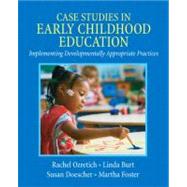Case Studies in Early Childhood Education Implementing Developmentally Appropriate Practices
, by Ozretich, Rachel; Burt, Linda; Doescher, Susan M.; Foster, Martha- ISBN: 9780135026038 | 0135026032
- Cover: Paperback
- Copyright: 12/11/2019
Developmentally appropriate practice is defined by the NAEYC as teachers making decisions about the well-being and education of children based on at least three kinds of information: What is known about child-development and learning What is known about the strengths, interests, and needs of each individual in the group Knowledge of the social and cultural contexts in which children live Both experienced and pre-service teachers need to follow these guidelines to ensure that they are supplying programs that promote the development and enhance the learning of all the children in their classrooms. In order to help teachers meet this goal of providing high-quality and developmentally appropriate programs for all children and their families, the authors have written a series of cases that exemplify the guidelines of the NAEYC, while at the same time showing students how to put the guidelines into actual practice. The cases in the book depict a diversity of children in diverse family settings and offer not just challenging situations, but possible solutions to those challenges. Each case is followed by a question (or questions) that promotes critical thinking and stimulates class discussion regarding the decisions the teacher made, the consequences of using specific practices, and the ethical bases for decision-making. The authors also stress the value of an anti-bias curriculum and its importance in creating a caring community of learners and preparing all children for the increasingly diverse world of the future.







